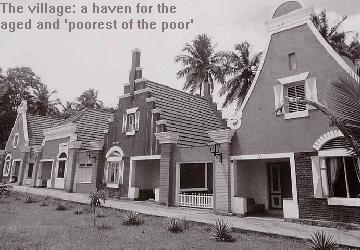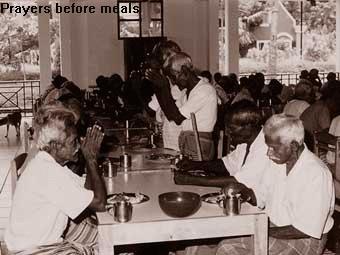

![]()
 Herman
Theodorus Steur was here in Sri Lanka in the year 1990 by chance. The wealthy
fish trader had a thriving business in the Netherlands, and noted with
enthusiasm that the Sri Lankan economy was picking up with the introduction of
the Free Trade Zones. He was keen to start a shrimp project at the Katunayake
FTZ.
Herman
Theodorus Steur was here in Sri Lanka in the year 1990 by chance. The wealthy
fish trader had a thriving business in the Netherlands, and noted with
enthusiasm that the Sri Lankan economy was picking up with the introduction of
the Free Trade Zones. He was keen to start a shrimp project at the Katunayake
FTZ.
However, the Sri Lankan power supply being heavily dependent on hydro power discouraged him from the venture. As he was enjoying his evening view from his hotel room in Uswetakeiyawa one day, he spotted a fisherman walking towards the beach. Suddenly the man fell down and died. His wife rushed to the scene weeping and wailing, her now fatherless children following her.
Herman Steur was disturbed by what he saw, and started making inquiries about the plight of Lankans who die in a similar fashion. He was told that there was no state support to people in such a plight, and the fisherman’s widow had no source of income, no support from anywhere, with the responsibility of providing for her young children thrust upon her overnight.
Shocked by these revelations, Steur helped the poor fisher woman by giving her the necessary coffin . Thereafter he decided to do his bit for the deprived people in Sri Lanka.
Initially, a family help programme was started in Pamunuwa to assist elderly married people without children. It was mainly a project to provide financial assistance, with preference being given to those living on the streets.
As the project expanded, a village was created in Wilagedara in the Kurunegala District, to provide shelter to the poorest of the poor, those who have taken to the streets for want of a dwelling.
 "We
call them roofless people, for their self respect is important to us. At present
we have 163 inmates at the Netherlands Welcome Village , and they are all
roofless, over sixty years of age and could be classified as the poorest of the
poor. Those are the criteria of selection as well," explained the Deputy
Chairman and the Executive Director of the Village Mr. W.O.P.Phillipsz.
"We
call them roofless people, for their self respect is important to us. At present
we have 163 inmates at the Netherlands Welcome Village , and they are all
roofless, over sixty years of age and could be classified as the poorest of the
poor. Those are the criteria of selection as well," explained the Deputy
Chairman and the Executive Director of the Village Mr. W.O.P.Phillipsz.
The number of roofless people in Sri Lanka is steadily increasing , a problem which goes hand in hand with poverty and the declining values of our younger generation. But in a country where parents and adult children live together in the same house and operate as one big family, how is it that there are increasing numbers of adults who are homeless, and condemned to lead lonely lives?
Mr. Phillipsz says there is an increasing demand for homes for the aged. When the Village was founded a year ago, it was decided that only the childless would be entertained. Mr. Phillipsz emphasized that it was the duty of children to care for their aged parents, and the acceptance of persons with children would perhaps encourage them to shirk their duty. It is the same principle which applies to those who try to be rid of their aged domestic aides. To ensure that the truly helpless gain entry to the Village, the Village sends its own people to take in homeless persons from the streets. If they come through recommendations, Village staff pay surprise visits to find out whether the case is a genuine one. Applications are also treated in the same manner to ensure that the most deprived people gain entry.
The Netherlands Welcome Village is situated in a sprawling 18 acre coconut estate, serene and peaceful.
"It was difficult to start our project here initially, this area being predominantly Buddhist. We had to explain that there was no ulterior motive, and explain the same to the Maha Sangha of the area. Today, the temple and the villagers are very supportive of us. Kurunegala being a rural place, it has the atmosphere conducive to the mental well being of the inmates," says Mr. Phillipsz.
The Village was declared open by Prime Minister Sirima Bandaranaike exactly one year ago, on the 30th of July . The first batch of inmates comprised 25 roofless persons.
The Village today has 83 houses, an office complex, library, a large dining hall designed for 400 persons with a fully equipped kitchen , pantry and bakery, hospital, laundry, quarters for staff, three guest bungalows, two shops ,saloon and a multi religious prayer building.
Mr. Phillipsz explained that 90 percent of the inmates were picked from the streets. Some had skin diseases, others had eye problems. Thus their various illnesses had to be treated.
" We first conducted an eye clinic and provided spectacles. Others were treated at the Village hospital, and some were referred to the Negombo and Kurunegala hospitals. It took us months to reach the present health standard," he said.

 Noela
Wanigasinghe is 67 years old, and still as pretty as a picture. She fell ill and
was taken to the nearest hospital by her daughter. When she was discharged ,
she was brought not to her home, but to the Welcome Village by a woman who
claimed that Noela had been found on the streets.
Noela
Wanigasinghe is 67 years old, and still as pretty as a picture. She fell ill and
was taken to the nearest hospital by her daughter. When she was discharged ,
she was brought not to her home, but to the Welcome Village by a woman who
claimed that Noela had been found on the streets.
Inside each house, there are four separate rooms, housing four inmates. The male and female inmates are not housed together as a rule. However , a childless couple and a brother and a sister have been allowed to occupy the same house.
Bernadeth Gunasekara is partially blind, and lives with his incapacitated brother Charles. Charles is daily helped by nurses to clean himself up, dressed and then fed. Sometimes the brother and the sister sit together outside their home, enjoying a quiet evening. " We had no place to go, and nobody to help us when the Village accepted us. I am so happy to live in this friendly atmosphere. We no longer feel un-cared for and neglected. But nothing could replace the love of a family, the inspiration it provides to a person" says Bernadeth.
Sharp at 12 noon all inmates except those who are incapacitated assemble in the spacious dining hall meant for 400 people. Most of them offer prayers prior to partaking the meal, a practice the inmates themselves introduced to the Village. Next to the dining room there is the store room, the pantry and bakery where a foreign trained cook mans the kitchen.
During lunch, we were introduced to 97 year old Jayasuriarchchige Daniel, the oldest inmate. He happily claimed that he was very healthy and happy, and has not taken even a Panadol for many years. "Pills means ills "he said , his thin face wreathed with smiles.
After lunch, some of them returned to their rooms for a siesta, and some stayed back to talk to us. A. Podimahattaya hails from a family of Ayurvedic doctors. Though he has left the his village in the Dedigama electorate and taken residence in this elders village, he is still the respected ‘veda mahattaya’ of the place. He still goes out to collect herbs from the vicinity , and prepare oinments and oils. Sometimes he helps the sisters and the nurses at the hospital to attend to patients.
Mervyn Claude Fonseka, another inmate, lived in luxury thirty years ago. He was a second engineer in a vessel, and subsequently worked for the most recognised shipping lines in the country. But when he lost , he lost everything; career, money, friends-everything. He was picked from the streets by Mr. Phillipsz.
Mr. Phillipsz claimed that despite these people coming from all areas ,and representing various religions and communities, the inmates live in amity. "There are no brawls, and we do not have too many temperamental people. They are quite grateful because they think that if they were not accepted by the Village, they would have been condemned to die on the streets. Contrary to popular belief, it is the female inmates who are more friendly and helpful " he says.
The Village also has a fully equipped hospital for the inmates. Sister Pauline manages the affairs of the hospital, with four sisters, thirteen nurses and two helpers who have had special training to care for aged people.
The Netherlands Welcome Village has about 1000 donors from Belgium and Holland. So far, local philanthropists have not extended support to the Village despite many requests made. The lack of benefactors has made the expansion of the Village difficult. As a result , the Village has decided to approach the business community for the sponsorship of inmates as each person requires about 2000 rupees a month for his or her maintenance. A three year sponsorship for each inmate is the current target of the Welcome Village.
Return to the Plus contents page
![]()
| HOME PAGE | FRONT PAGE | EDITORIAL/OPINION | NEWS / COMMENT | BUSINESS
Please send your comments and suggestions on this web site to
info@suntimes.is.lk or to
webmaster@infolabs.is.lk